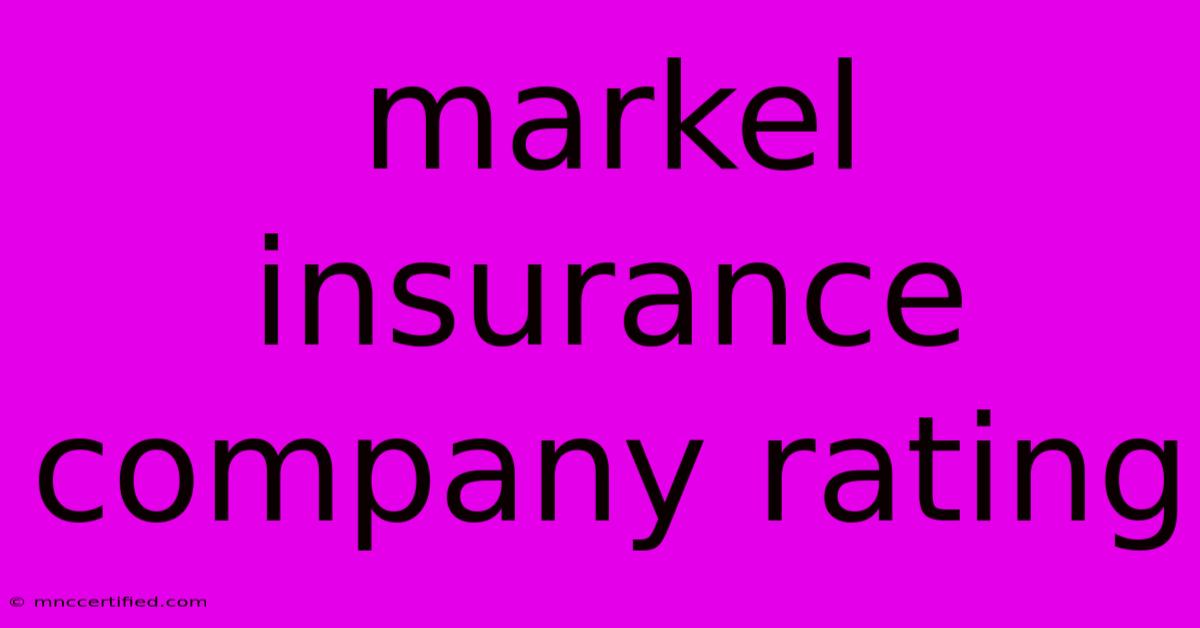Markel Insurance Company Rating

Table of Contents
Markel Insurance Company Rating: A Comprehensive Review
Markel Corporation, a diverse financial holding company, is known for its specialty insurance operations. Understanding its financial strength and insurance ratings is crucial for anyone considering Markel insurance products. This article provides a comprehensive overview of Markel's insurance company ratings, exploring the key rating agencies, their assessments, and what these ratings mean for potential policyholders.
Understanding Insurance Company Ratings
Before diving into Markel's specific ratings, it's important to grasp the significance of these assessments. Insurance company ratings are provided by independent rating agencies like A.M. Best, Moody's, Standard & Poor's (S&P), and Fitch. These agencies analyze insurers' financial strength, underwriting performance, and overall management capabilities. Higher ratings indicate a lower risk of the insurer's inability to meet its policy obligations.
Ratings are typically expressed using letter grades and modifiers (e.g., A++, A+, A, A-, etc.). A higher letter grade signifies a stronger financial position. For example, an A++ rating suggests exceptional financial strength and stability, while a lower rating, like B-, indicates a weaker financial position and higher risk.
It’s crucial to remember that these ratings are snapshots in time and can change based on a variety of factors, including economic conditions and the insurer's financial performance.
Markel Insurance Ratings: A Breakdown
Markel's insurance subsidiaries receive ratings from various agencies. It's essential to check the most up-to-date ratings directly from the rating agencies' websites, as ratings can change. However, generally, Markel and its subsidiaries consistently receive high ratings, reflecting their strong financial position and consistent performance. You might find ratings such as:
- A.M. Best: Often assigns high ratings, reflecting Markel's strong underwriting performance and robust capital position. Check A.M. Best's website for the most current rating.
- Moody's: Similar to A.M. Best, Moody's typically assigns investment-grade ratings to Markel, signifying a low risk of default. Consult Moody's for the latest information.
- Standard & Poor's (S&P): S&P also usually provides high ratings for Markel's insurance operations. Always verify the current rating on S&P's official platform.
- Fitch: Fitch Ratings also provides assessments of Markel's financial strength. Check their website for the latest rating available.
What Markel's Ratings Mean for You
High ratings from reputable agencies suggest that Markel is a financially sound insurer with a lower probability of failing to pay claims. This translates to greater peace of mind for policyholders. However, a high rating isn't a guarantee of a perfect experience. Consider other factors like:
- Customer service: Read reviews and testimonials to assess the quality of Markel's customer service.
- Policy coverage: Carefully review the specific terms and conditions of any policy before purchasing.
- Price: Compare premiums from different insurers to ensure you're getting a competitive rate.
Factors Influencing Insurance Ratings
Several key factors contribute to an insurance company's rating, including:
- Underwriting performance: The ability to accurately assess and price risk.
- Investment portfolio: The quality and diversification of the insurer's investments.
- Capital adequacy: The amount of capital available to meet obligations.
- Management quality: The experience and expertise of the insurer's management team.
- Reserve adequacy: The level of reserves set aside to pay future claims.
Conclusion: Research Before You Choose
While Markel consistently receives high ratings, it's crucial to conduct thorough research before purchasing any insurance policy. Consider comparing Markel's offerings with other reputable insurers, reviewing policy details carefully, and reading customer reviews. Always refer to the official rating agencies' websites for the most current and accurate rating information. Making an informed decision based on both ratings and other relevant factors will help you choose the best insurance coverage for your needs.

Thank you for visiting our website wich cover about Markel Insurance Company Rating. We hope the information provided has been useful to you. Feel free to contact us if you have any questions or need further assistance. See you next time and dont miss to bookmark.
Featured Posts
-
Worlds Smallest 63cm Life Challenges
Nov 23, 2024
-
Chers Strong Reaction To Mask Director
Nov 23, 2024
-
Milwaukee Bonded Abrasive Wheel
Nov 23, 2024
-
Chester A First Look Preview
Nov 23, 2024
-
Video Tallest Shortest Womens London Meet
Nov 23, 2024